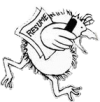Blog
Job Interview tips
The dangers of labels
Embrace your Imposter Syndrome
Job interview tips for those worried about having the 'Imposter Syndrome'.It is a fairly newly discovered condition (1978) which according to its finders can create a significant barrier for people working in responsible positions or seeking employment, because the person thinks that they really don't have the ability to do the job and at anytime someone will discover their 'deep dark secret'.
Symptoms people with this 'condition' will tend to withdraw from colleagues and don't share or seek information for fear of being discovered or not being themselves at interviews. However, before you rush off to a counsellor, stop a minute and think. This 'condition' is not new and the only people who really don't have it are likely to be those who lack total insight of how their attitudes and behaviours impact on the those around them. In fact, it is one of the most normal of human conditions, which has been around since the human race began and is the reason we survive, learn and make advances. It is in fact a great motivator. As a job interview trainer/coach, with over 10 years experience in giving job interview tips, I have found that client's with 'Imposter syndrome' are predominantly 'can do' people, who have insight into their strengths and weaknesses, are willing to learn new skills, and are flexible and adaptable. They are goal oriented, strategic and focussed, willing to share information and contribute to the overall goal of the organisation. Their only 'barrier' is that they lack the 'look at me' syndrome and are willing to share success. When going to interviews they tend to use the word 'we' instead of 'I' and undervalue their contribution to successes. You should only be worried if you can't relate to the benefits of imposter syndrome:
• It provides people with the ability to reflect and make strategic decisions about their work, education and lifestyle.
• It enables people to review their career goals, strategies and find new directions.
• It enables individuals to build relationships inside and outside of work.
• It can be a driving force for success.
• This insight can assist you to look at innovative ways to solve problems, improve systems and create new opportunities.
As an employer I would prefer to employ someone who has some 'Imposter Syndrome' than a candidate who does not question their abilities or reflect on their actions, successes and failures. To learn how to use your imposter syndrome to improve your interview techniques and demonstrate your abilities to prospective employers Reflect on your achievements over the last 12 months and write a list Ask your colleagues and trusted friends to give you feedback and write these down You will soon realise that your achievements are far greater than your weaknesses and make a plan for action to improve on your weaknesses one or two at a time. Would love to hear about your experiences, please make a comment or send a question. For more job interview tips contact Deborah Barit on (02) 9331 1853 mobile 0412 007 682
© 2024 Impressive Interviews. All Rights Reserved.

